How does Carlos Criado-Perez plan to revitalise Safeway? The chief executive agreed to take questions exclusively from Julian Hunt
You have been making plenty of changes since taking charge at Safeway, what's been the main challenge?
I think the biggest single thing I am working to achieve is a change of culture. We have done a lot of things but the common denominator is the culture. We have redefined our vision, looked objectively at our position and capabilities, and defined a strategy consistent with our position one capitalising on being the smallest of the biggest.
So how is Safeway being repositioned?
There are four things we would like to be recognised for. First, we want to be focused always on product and price. We want to be recognised as the retailer that has the best offers in retail in the UK [through deep price cuts on recognised brands].
Second, we want to be the best when it comes to availability. We have recognised the UK market compromises on availability either during the day or on certain days of the week. There are many, many areas not well served.
Third, we want to have the best customer service. We are not just talking about the industry standard, or how long you wait in a queue, but about really creating an environment in which you have a shopping experience that gives some personal contact and bonding with our people whether it's with the fishmonger or the butcher.
And, fourth, we want to be best at freshness. By that we don't just mean the range and the quality. We are talking about making the product become the hero. We want to work it in a manner where the leading role is taken by the product and not the fixtures, the decoration, the presentation or whatever.
There are a lot of basic retail practices that have been pushed aside in the UK in the pursuit of category management going beyond where it has to go [in terms of what is put on the shelf]. There has to be a backpeddling, going much more into a stimulating shopping experience where the technical or scientific part is in the background supporting the product. Statistics are important; stock management are important. But at the end of the day the buying is done when the customer stands in front of your shelf and sees the food and either likes it or doesn't.
But what will all that actually give you in terms of a new market position?
We want to make Safeway recognised for giving something better than anybody else is offering. It will take quite some time because we need to change the culture of the company to make people work with a passion behind the products and customers, and behind getting availability every day, in every store, every hour of the day. If you do not have that passion in the culture, you cannot enforce it because the stress and pressure will break your people.
But how will you be different?
As I said earlier, we have to really be focused on being best at product and price, best in availability, best at customer service and best at freshness. When you add those four together, they come to more than best price.
If you take Asda with its emphasis on price, you have to agree they are compromising on other things because price is everything. I'm not saying they have bad service, but to an extent they would be prepared to sacrifice everything to achieve price.
I think they are suffering from us. We are taking market share from Asda and we will take much more from them. To be able to operate an Every Day Low Pricing strategy you need to be a dominant player. They are not. So what they do is an EDLP which is compromised and therefore will not achieve what they want and becomes very vulnerable to a strategy of promotions. A strategy of promotions is what we can play because we do not have the deep pockets of Wal-Mart and so we need to generate a price perception stimulating enough for people to come and shop in our stores.
So you think a lot of your sales growth is coming from Asda?
We are taking market share from everyone at this moment. Perhaps the most resilient one is Sainsbury because the loyalty of their customers is very strong at least to our type of promotions. In The Sun two weeks ago, Asda had full page ads saying they would match Safeway prices, so they are obviously concerned with us and very aware of us. And we will continue to build market share. We are growing very fast and will continue to grow fast.
But is your sales growth profitable?
We chose to drive profits through sales because we feel market share in our company is important you can hardly be niche being one of the four biggest players with national coverage and a complex asset portfolio. There has to be investment because you either become more competitive or you do not sell more. And that means cheaper prices.
Hopefully, once you have invested money and time, two things happen. Economies of scale improve, so cost reduces in terms of percentage of sales, so there's more available to invest in price. At the same time, your volume grows, so you can sit down with suppliers with the prospect of growth and so your conditions with them improve, too.
Suppliers need to see the evidence, so there's a period where you invest more than you would otherwise, because you need to make the market believe you can do it. But that is behind us. We feel very supported by suppliers at the moment.
Are suppliers supportive? Your 1,000 Line Availability Focus, where you asked suppliers for cash support, created uproar didn't it?
Most suppliers joined the scheme. Some were convinced; some were sceptical. Others complained. They were mostly small produce suppliers whose industry is in very bad shape. It's very difficult to convince someone who is just trying to survive til tomorrow that they should invest for the future. That eventually got taken up by the NFU which blew everything out of proportion.
We are now four months on. There are no complaints. Suppliers are very happy with results, and so are we. It's proven to be a very worthwhile investment, and we are planning to roll out another 1,000 lines because we have 1,000 lines with 99.5% and above availability and we want to introduce that on more.
The chairman David Webster and myself have been talking to crucial and strategic suppliers in the past month and are delighted to see the support they are giving it's really fantastic. But that does not come out of charity. It comes out of the perception we are one of the country's fastest growing companies in food sales.
Our growth comes despite the fact we have practically no non food, have petrol sales well below our competitors, and have dropped the practice of buy one get one free offers which have a crucial impact on like for likes.
Added to which we have practically no extensions in our stores a huge element in Tesco's growth. If you take their 4% like for likes, take away 2% for petrol, another 2% for non food sales, and add in their extensions, then perhaps their like for like growth is not so wonderful it's even negative.
Doesn't your aggressive promotional activity and locally run activity create logistical nightmares?
Well, yes it does unless you know how to do it well and have the skill to operate it efficiently. The whole trick to logistics is that it can only be implemented with accurate information. That's why the system we have is very good. I won't tell you why, because I want our competitors to still feel we are making a mess of it, that it's a disaster, nothing works and it's very dangerous to operate like this.
For them, it would be. A centralised company cannot operate efficiently in a decentralised manner. You need a real change in culture and a strategy that accommodates this. We have it and are operating it very skilfully, because we are investing the same as before but in a much more efficient manner that gave us like for like sales growth in the first half of 6% more than what we need.
How much autonomy have you really given store managers? Isn't it just a lot of hype?
We have in place a daily P&L for every store manager and they have the capability and freedom for a certain number of Known Value Items to compete with local competition. So they can exercise their own criteria and wisdom to compete more effectively. But the next morning, they see the effect of what they did. They manage their cost, their margin, their investment on promotions, and they have a leading role in determining what goes into the seasonal flyer and the weekly flyer, and what goes into the store.
Where does the ABC loyalty card fit into all of this?
It provides information for us and allows us to gear our actions more effectively It helped enormously in the beginning when we were choosing how to develop the flyers and the catchment areas of the stores. There are a whole series of other promotions done based on the profitability of the customer, and there's an enormous amount of detailed information that we use. This information is essential for a small player like us to keep us well informed, and that's where I see the best role for ABC.
So you have no plans to axe the card?
We have no plans like Tesco with their treble points. We are focused on product and price, so we are looking at doing offers and not doing gimmicks. I find people are becoming cynical and sceptical about the role of the loyalty card. Everybody has them and everybody is offering more or less the same thing. I don't think it's effective in direct relation to sales. However in the area of information it is absolutely essential in driving a strategy like ours.
You talked earlier about being market leader. What do you mean by that?
I am not talking about scale. Obviously we cannot be the number one in size, but we can certainly be the number one in terms of being the best. And if we manage to get those four things right product and price, best in availability, best in customer care, best in freshness we will be better than any other player in the market.
If you consider we sell £9bn, and, as I mentioned before, you consider we are selling £15.7/sq ft and the industry leaders are £21 or £22, that means we are selling about 30% less than the market average. That means we need to get more people in our stores. But it also means we can grow a hell of a lot without investing a penny just by doing a good job. So we can grow and take market share. But it will take time.
But haven't investors heard all this before? Why is the new look Safeway going to be different?
Yes, investors have heard this before. They just have to decide whether to believe there is a plan here. Once our results are published, they will have enough to decide that this company has taken a turn for the right side finally and for good.
So what role will Safeway play in the consolidation of the industry?
It's pretty unpredictable. It could be national or could be international. It could be nothing. It could be we remain independent.
But in all scenarios, we need to have a strong Safeway that is leading in retail practices, on the front foot and doing a good job.
I would hate to be in any position either independent or looking into a merger with a company that had problems. I think there is a lot in the market that will also happen and plenty of unknowns. I don't know what will happen to Asda. I don't share the perception of the market that Tesco is so wonderful and so strong. I have serious doubts about that. It is very stretched. Is Tesco going to consolidate with someone else? Could be.
Sir Peter Davis is good news for Sainsbury, but what's going to happen? They have not opened their mouths yet about what they want to do. But there are no visible signs. I go to a Sainsbury store this weekend and see the same as four months ago they are very slowly going down.
But isn't Sainsbury now preaching a very similar message to yours?
With one difference. We are, to an extent, trying to go to a much more universal client base. We are opening up our brand. My perception is they are going to try to regain the top end of the market that they used to hold.
If you do open up the Safeway brand, will you not alienate middle class family shoppers?
We will lose something. You cannot be the best for everyone. But we want the widest scope in clients, which does not mean the absolute extremes will remain with us. The upper stream will remain with Waitrose on one side, and in Asda and Aldi on the other. We are not targeting a client segment in a way that exclude others. We are trying to give the best retail proposition.
So why ditch the Lightening the Load corporate strapline?
We decided it really was not very consistent with the message we wanted to give. Our message is more: come to our shops, stay in our shops, and have a more enjoyable and stimulating experience.
And what about e-commerce?
This is not on my agenda for today. I do feel there is a possibility that e-commerce will be very important but it still needs to be proven. So we have to put a foot in the door, develop the systems, and test the possibility of driving e-commerce. But it still needs to be proven it can be exercised efficiently and economically.
We will present in May our view and our vision and our plan for e-commerce and let everybody know what we think about it. We will definitely be a player. But will we jump in the swimming pool like Tesco and Sainsbury? It's too premature to do that. It would be irresponsible to lead an initiative at this time. But it's something I see coming. n
{{COVER FEATURE }}
Close menu
- Home
- Retail & Wholesale
-
Products & Suppliers
- Back to parent navigation item
- Products & Suppliers
-
Product Categories:
- Back to parent navigation item
- Product Categories:
- Alcoholic drinks
- Bakery
- Cereals & breakfast
- Cheese
- Chicken & poultry
- Chocolate
- Confectionery
- Crisps, nuts & snacks
- Dairy
- Fish
- Fresh produce
- Frozen
- Household
- Meat
- Own Label
- Sauces & condiments
- Seasonal
- Soft drinks
- Vaping
- Vegan & plant-based
- World foods
- Suppliers
- People
- Reports & Data
-
Topics A-Z
- Back to parent navigation item
- Topics A-Z
-
Popular topics:
- Back to parent navigation item
- Popular topics:
- Cost of living crisis
- Crime
- Deposit Return Schemes
- Finance
- Government & Regulation
- Health
- Inflation
- Loyalty
- Marketing
- Mergers & Acquisitions
- New Product Development
- Sourcing
- Supply chain
- Sustainability & environment
- Technology
- Ultra Processed Foods
- Vaping
- A-Z all topics
- Content by type:
- Events
- Ask iA (beta)
- Subscribe now
Sign in to comment on this article
Not logged in before? Register for FREE guest access today.
You will be able to:
- Read more stories
- Receive daily newsletters
- Comment on stories
Advert










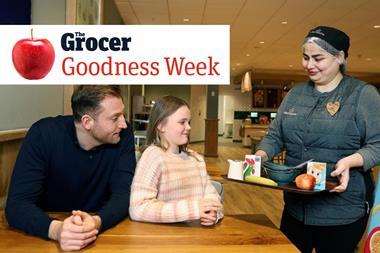
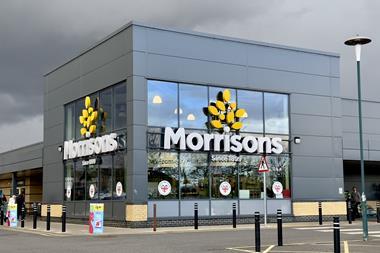



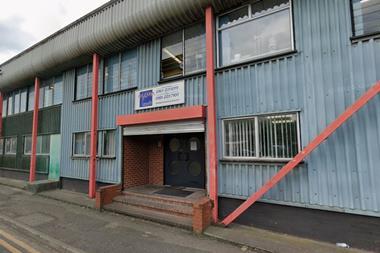
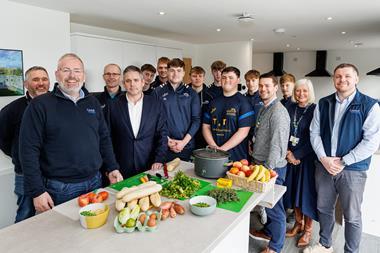

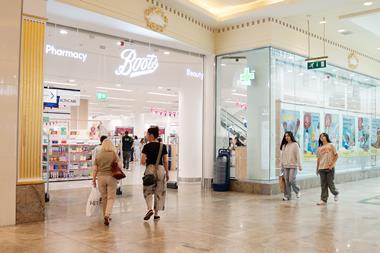
No comments yet